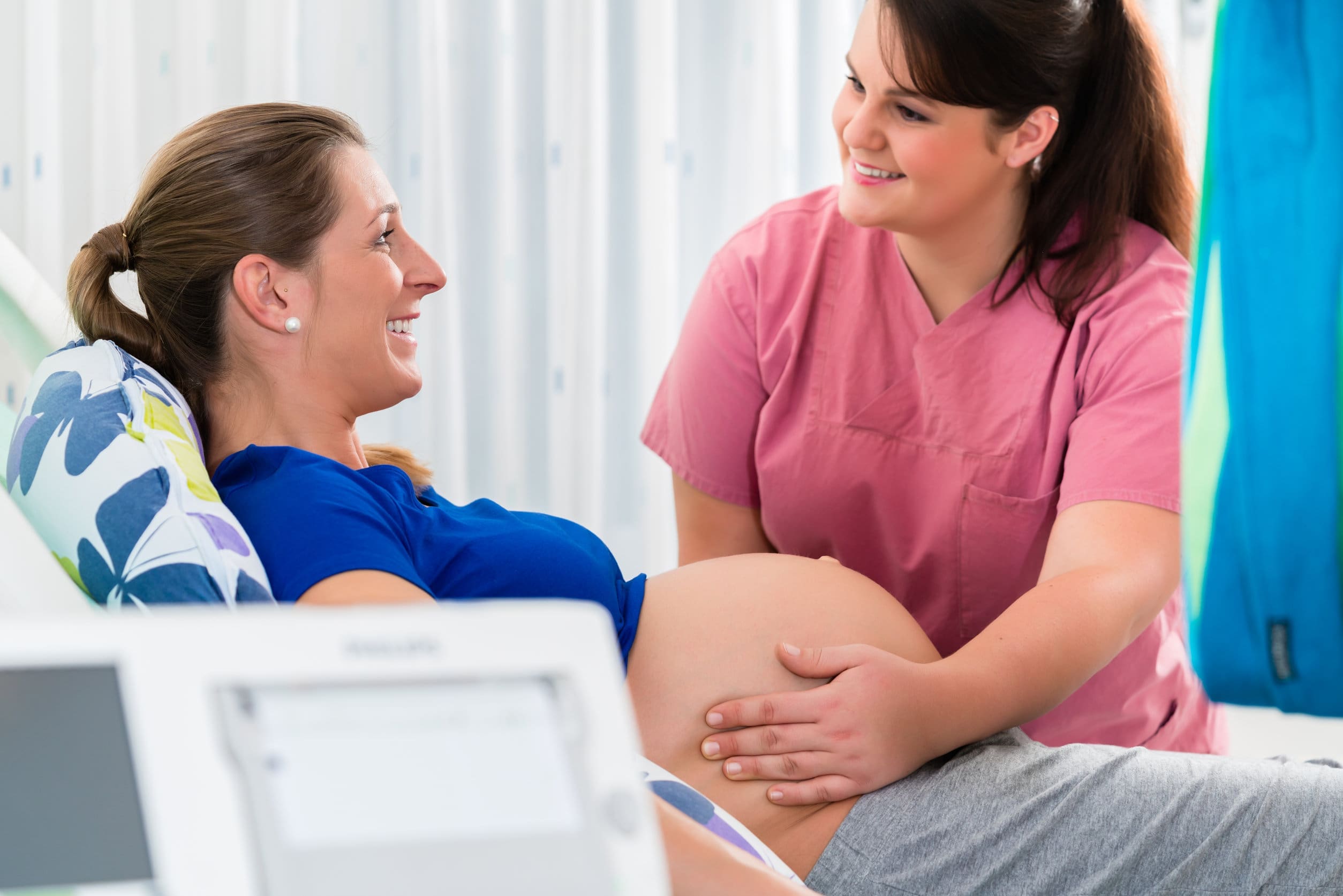In this post
What is a midwife?
A midwife is a specialist in pregnancy and birth. Their primary role is to take care of pregnant women throughout their pregnancy, during labour and birth, and for the early postnatal period.
Being a midwife is a physically and emotionally demanding role, but it’s also incredibly important and is highly valued in society. Midwives are in high demand, both in the NHS and privately, making it a solid career choice with abundant opportunities throughout the country.
In 2020, there were approximately 51,000 midwives in the UK and this figure is rising. In 2010, there were around 36,000 midwives and it’s predicted the numbers will increase further in the coming years with higher demand.
Midwifery is related to nursing, and there are many similarities in terms of the role itself and the skills and traits that are needed, but it remains a separate profession.
A midwife has a diverse, interesting role that includes various aspects of care, including clinical care for pregnant women and those in labour, providing health education to women and their families, and supporting the mother and her family in preparing for parenthood.
The typical working hours for an NHS midwife are 37.5 hours a week for full-time positions. This will follow a shift pattern that can include nights, evenings, weekends, early mornings, bank holidays, longer shifts, and antisocial working hours.
Depending on the type of role they pursue, midwives can work in an NHS or private hospital, a GP practice, a clinic or health centre, a midwifery unit, or in the local community.
Personal qualities of a midwife
It’s important for midwives to build strong relationships with their patients and their coworkers. New mothers and their families need to feel supported and will require help and advice throughout the pregnancy, in labour, and in the weeks following the birth.
Here are some of the personal qualities that a midwife will need to be successful in their role:
- A caring attitude and being sensitive and understanding
- Having an interest in medicine and neonatal care – especially in pregnancy and birth
- The ability to work well under pressure and manage stressful situations
- Strong people skills and being able to work with patients and team members
- Effective communication skills to provide the best possible care
- Being able to get on with people from a wide range of backgrounds
- Having good listening skills and being non-judgemental and accepting
- Being patient and having a mature attitude
- Strong attention to detail and observational skills
- Having emotional and mental strength and resilience, especially in distressing situations
- The ability to take the initiative and take responsibility
- Can carry out basic tasks on a computer or handheld device

What a midwife does
Being a midwife is a varied and interesting role. Midwives are required to provide different types of support to women in different stages of pregnancy. They provide antenatal and postnatal care and can face a range of challenges, such as:
- Dealing with high-pressure situations and medical emergencies
- Physical demands like lifting pregnant women and working long shifts
- Emotional demands like dealing with bereavement or domestic abuse
- Exposure to bodily fluids and other unpleasant sights
- Dealing with difficult people with unreasonable demands
When complications arise, they will also need to recognise this and deal with the situation or refer patients to a doctor or specialist in a particular area when needed.
Midwives need to be trained to deal with medical emergencies that may come up. They are also responsible for screening for potential problems, monitoring women during their pregnancies, and providing health education, and helping people prepare for becoming parents.
Midwifery is a fast-paced, hands-on role. In fact, figures from the Royal College of Midwives show that each midwife delivers 27.5 babies a year on average as the number of live births has increased by 12.5% since 2001 and is at a 26-year high.
There are many day-to-day tasks that are required in this role. Some of these tasks include:
- Examining and monitoring women during pregnancy
- Running screening tests to check the mother and baby’s health
- Explaining different options like whether to give birth at home or in hospital
- Helping to develop suitable care plans for pregnant women
- Identifying high-risk pregnancies and making referrals when needed
- Providing advice to pregnant women on different health-related issues
- Running pregnancy and parenting classes and offering other education and support
- Supervising and assisting women in labour and checking their progress
- Monitoring the health of the baby during labour
- Providing pain relief and other pain management advice during labour
- Delivering the baby and providing aftercare
- Offering support in cases of stillbirth, miscarriage, or other complications
- Providing community care and visiting people’s homes to offer support
- Identify individuals at risk of abuse or domestic violence
- Giving advice on caring for the baby and breastfeeding
In the NHS, midwives are split into two groups: hospital and community midwives. Hospital midwives are based in a hospital unit, birth centre, labour or postnatal ward, hospital obstetric unit, or a consultant unit.
Community midwives work in the community to provide care. They usually work in teams, and visit people in their homes, at a GP practice, or in a clinic. They provide a range of antenatal and postnatal services, as well as assisting women that have opted for a home birth.
How much does a midwife earn?
According to PayScale, the average midwife salary in the UK is £29,586, but the actual figure each person will get will depend on how much experience they have in the role.
Salaries for NHS employees are determined using a banding system. Fully qualified midwives start on Band 5, which means they have a starting salary of £25,655, which rises to £27,780 after two years of experience and £31,534 with four years of experience or more.
By gaining more experience and learning new skills, midwives can also move up to higher bandings. For Band 6 roles, the starting salary is £32,306 and Band 7 starts at £40,057.
There is a range of courses available for midwives that want to increase their skills and advance their careers. They can also take a master’s degree or become a specialist in a certain field, like antenatal screening, which would increase their salary further.
NHS workers also have access to other employment benefits, including a generous pension scheme, 27 days annual leave plus bank holidays, and health worker discounts.
In the private sector, midwives’ salaries aren’t regulated in the same way. However, the average salary is similar to that in the NHS and can be slightly higher. The average private midwife earns around £35,000 but receives a less generous benefits package and a private pension.
Midwives that take the apprenticeship route will receive £4.30 per hour if they are under 18. Anyone 19 or over will receive £4.30 per hour in their first year and the National Minimum Wage or National Living Wage rate for their age group after this.
Qualifications needed for a midwife
The normal route to becoming a midwife is to take an undergraduate BSC (Hons) degree in midwifery that’s approved by the Nursing & Midwifery Council.
This course takes a minimum of three years to complete. However, some applicants might be able to complete a degree in 18 months or two years if they already have a related degree and choose a postgraduate option, or if they are already a registered level 1 adult nurse.
Entry requirements depend on each university, but most will require 2 or 3 A levels, including a science subject like biology or a social science subject, along with at least 5 GCSEs at grades 9 to 4 (A* to C), or equivalent, including English, maths and at least one science subject.
Some applicants may also be accepted with a level 3 diploma or access to higher education in health, science, or nursing, or other qualifications, but this depends on the provider. Further information on approved courses and how to become a midwife can be found on the UCAS website.
It’s currently estimated that the NHS is short of the equivalent of almost 2,500 full-time midwives. Due to this high demand for midwives, students are also entitled to receive £5,000 a year to help with their studies, and this could be higher depending on their personal circumstances. This money doesn’t need to be paid back.
A midwifery degree consists of a combination of teaching and practical clinical placements. The practical training includes direct contact with pregnant women and their families in their homes, in the community, in hospitals, and in birth centres or midwife-led units.
An alternative route to becoming a midwife is to take a midwifery degree apprenticeship. The entry requirements depend on the employer, but most will require 5 GCSEs at grades 9 to 4 (A* to C) and 3 A levels or the equivalent for a degree apprenticeship.
Apprenticeships include a mix of on-the-job training in an approved workplace and classroom learning in an academic setting like a university or college.
Before applying for a midwifery course, applicants are often encouraged to get some paid or voluntary work experience in a related field in the health and care sector. This helps them to understand the nature of the work and what is expected of them. Voluntary roles can be found by searching The National Council for Voluntary Organisations.
On the job training
After being more experienced in the role, there are many opportunities for midwives to further develop their skills through on-the-job training and additional study.
One option is to become a specialist in a particular area, such as neonatal care, ultrasounds, antenatal screening, or providing breastfeeding advice and support. Another option is to move into a similar field, such as health visiting or neonatal nursing.
Some midwives choose to take a master’s degree alongside their job to advance their skills further. Some are able to get sponsorship from their employer to do this.
Alternatively, a midwife could progress their career by moving into an academic area, like taking up a clinical academic career in research or studying to teach midwifery students.
For highly experienced midwives, another way to progress is to consider becoming a consultant midwife. This role consists of providing clinical leadership for midwives and healthcare professionals across a range of maternity services.
Or, many midwives choose to take on more responsibility by becoming a leader or a ward manager. This means taking responsibility for other midwives, as well as taking a more hands-on role with patients and families. This could eventually lead to more influential roles in the sector, such as head of midwifery or director of midwifery services.
The NHS Leadership Academy currently runs several programs. to help midwives hoping to move into leadership positions. These programs are designed to build confidence and skills

Professional bodies
After qualifying, all midwives in the UK are required to register with the Nursing & Midwifery Council before they practice in any healthcare setting. They must also renew their membership every three years to ensure their skills are fully up-to-date.
In order to register, individuals must first complete an approved midwifery program of education and meet other requirements. These requirements include being in good health, as well as passing character checks including an enhanced background check.
To keep their registration active, they must also meet certain conditions, which include working a minimum number of hours in a midwifery role and attending study events.
Midwives also have the option to register with the Royal College of Midwives, which offers a wide range of courses, events, and networking opportunities to build their skills further.
The Royal College of Midwives has over 48,000 midwives and student midwives registered, and members can network with others in the industry and find different midwife jobs and opportunities, workshops, professional conferences, and more to progress within the industry.



